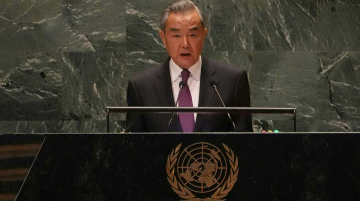
By Lukas Fiala 方朗克
After expanding the guest list of BRICS in August, Beijing has been busy articulating its vision for reforming global order. The publication of a position paper on global governance reform launched by the Ministry of Foreign Affairs on September 13th as well as a white paper on the Global Community of Shared Future published on September 26th.
In the context of China’s high-speed diplomacy over the last 9 months – since the end of strict COVID-19 measures in China – it’s surprising that these events have not caused more of a stir among China watchers and analysts.
The position paper begins with a pessimistic assessment of our contemporary world, identifying “deficits in peace, development, security and governance” which are putting “humanity…once again at cross-roads.” This is followed by sections on security, development and governance of human rights and technology as well as a concluding part on the importance of the UN, corresponding to China’s three global initiatives on security, development and civilization (GSI, GDI and GCI) as well as the overarching Belt and Road Initiative (BRI) framework.
For those with more stamina, the whitepaper delves into considerably more depth. Beginning with a similar characterization of contemporary global challenges, the paper presents principles for organizing China’s proposed “community with a shared future”. Awash with lofty goals and aggrandizing language, the document calls for (1) the promotion of the BRI; (2) the implementation of GSI, GDI and GCI; (3) the regionalization of China’s global governance agenda – especially through the creation of “communities” with regions such as Africa and Southeast Asia; and (4) a broad understanding of governance including cyber, health, and climate governance.
The key question, of course, is what all this actually means. Both the position paper and the white paper should be interpreted within the overall shift in Chinese diplomacy away from ‘major country diplomacy’ – Xi’s policy shorthand for dealing with the great powers – towards an emphasis on the Global South as the theatre in which China is most able to find diplomatic opportunities.
As is often the case with official Chinese documents, commentators have pointed to the considerable ambiguity of both papers as a weakness of China’s approach to reforming the international system. Because “Beijing remains incapable to clearly state its global positions”, so the argument, China will have a hard time convincing other countries to help build a meaningful alternative to Western-led global order.
Such an interpretation, however, needs to account for two qualifications. First, China generally does not think of such documents as clear grand strategic blueprints or policy documents. They might feature principles that echo grand strategic intentions, but Beijing has long eschewed formal and codified treaty commitments where this is possible in favor of situationally contingent partnerships.
In these frameworks, ambiguity is not necessarily a weakness, but can in fact become advantageous, especially in situations characterized by asymmetric interdependence or those where China needs to balance different – and sometimes conflicting – interests among different parties. Keeping partners at arm’s length makes it easier for Beijing to maneuver.
Further, China is certainly more than capable of delineating clear positions when it wants to, such as in the case of the “One China” principle or the human rights situation in Xinjiang. Ambiguity is thus not so much an unintended consequence of Chinese policy language as an integral component of China’s political communication.
Only by developing a nuanced understanding of when ambiguity helps China’s broader diplomatic objectives and when it does not can we gain a better understanding of how successful Beijing’s newly intensified quest to strengthen links with regions across the Global South will be.
Lukas Fiala is the project coordinator for the China Foresight initiative at LSE IDEAS.









